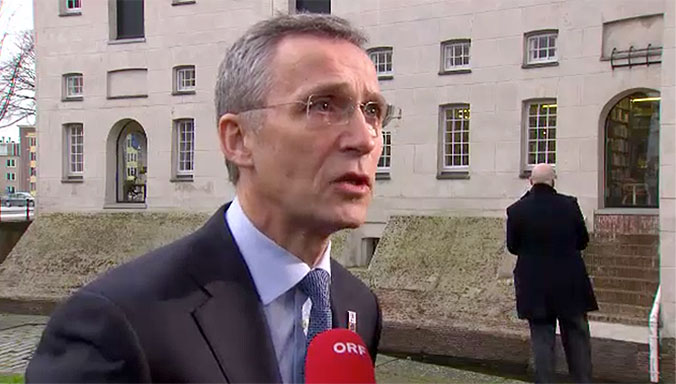Doorstep statement
by NATO Secretary General Jens Stoltenberg at the Informal meeting of the European Ministers of Defence in Amsterdam
(As delivered)

Good morning, good morning,
I’m looking forward to meet with the EU Defence Ministers and I’m looking forward to discuss with them how we are responding to a more demanding and challenging security environment.
And recently we have seen some very important steps in the right direction.
A few days ago the United States announced plans to substantially increase their military presence in Europe, by increasing four times the amount they spend on military presence in Europe, so they can fund more troops in the Eastern part of the Alliance, so they can finance the prepositioning of heavy equipment, tanks, armoured vehicles and other kinds of heavy equipment. And also more exercises and more investments in infrastructure. So this increased US presence in Europe is an important sign and part of the adaptation of the Alliance to a more demanding security environment.
Another positive sign is what we see regarding defence spending in Europe. After many years of substantial cuts in defence spending, last year the cuts in defence spending in Europe practically stopped.
That’s of course only the first step but it is a step in the right direction. The picture is still mixed, but we are moving now in the right direction.
And then of course we also see increased interest for cooperation between the European Union and NATO. I welcome that and I will discuss with the ministers how we can work more closely on challenges like hybrid threats, like working together to stabilize our neighbourhood in the South. And also on other issues which are of great importance for both the European Union and NATO.
Let me finally also add a few words about Syria. NATO strongly supports all efforts to find a negotiated peaceful political solution to the conflict in Syria.
What we have seen is that the intense Russian airstrikes, mainly targeting opposition troops in Syria, is undermining the efforts to find a political solution to the conflict.
Moreover, the increased Russian presence air activity in Syria is also causing increased tensions and violations of Turkish airspace.
This creates risks, heightened tensions and is of course a challenge for NATO because they’re violations of NATO’s airspace.
And then the substantial Russian military build-up in Syria and the Eastern Mediterranean is also shifting the strategic balance in this part of the Mediterranean.
So I call on calm de-escalation and a political solution to the conflict in Syria.
QUESTION (AFP): Russia is accusing Turkey of preparing an invasion in Syria, What is NATO’s response to that?
SECRETARY GENERAL: I think we have to look at the facts and the facts are that Russia is conducting many strikes, intense air strikes, mainly directed against opposition groups. We have seen several violations of NATO air space, of Turkish air space. So this is something which is now undermining the efforts to find a political solution to the conflict in Syria.
QUESTION (Reuters): Secretary General, can you comment about reports overnight of the Islamic State moving into Libya in more substantial numbers and what can NATO do to help the situation?
SECRETARY GENERAL: We are following very closely the developments in Libya. This just underlines the importance of fully supporting efforts to find a political solution, to reach a ceasefire and to have an agreement on a unity government in Libya. Because that will be an important first step, also to be able to fight ISIL.
NATO stands ready to support a new unity government in Libya. To help them build defence institutions, to help them in different ways, but that requires a request from a new unity government in Libya and, of course, a new situation on the ground in Libya to enable such support from NATO.
